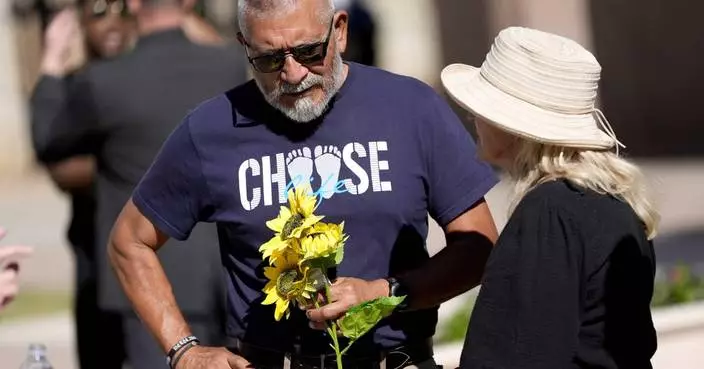Thousands of women marched through the streets of Rio de Janeiro on Monday to protest a recent congressional committee vote to make abortion illegal without exception in Brazil.
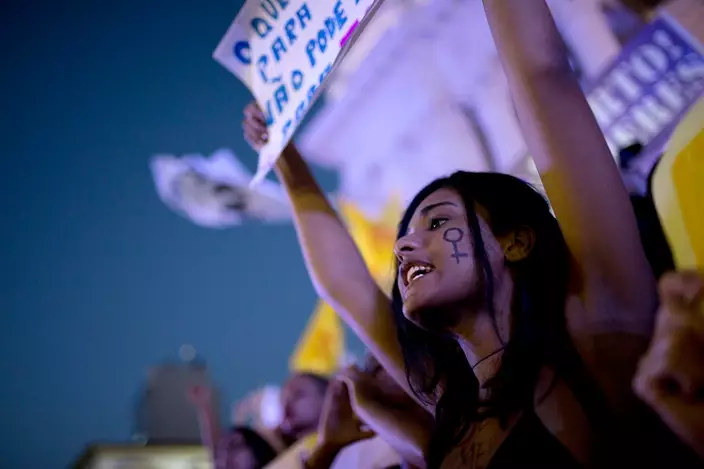
A woman protests a proposal for a total ban on abortions in Rio de Janeiro, Brazil, Monday, Nov. 13, 2017. (AP Photo/Silvia Izquierdo)
Many protesters carried their children in their arms or on their shoulders, shouting: "Our bodies are ours!" Some scuffles broke out between protesters and police when the march reached the Rio state legislature. Police fired tear gas, but calm soon returned.
Click to Gallery
Thousands of women marched through the streets of Rio de Janeiro on Monday to protest a recent congressional committee vote to make abortion illegal without exception in Brazil.
Many protesters carried their children in their arms or on their shoulders, shouting: "Our bodies are ours!" Some scuffles broke out between protesters and police when the march reached the Rio state legislature. Police fired tear gas, but calm soon returned.
A woman with the word "Legalize" painted on her mouth marches against a recent congressional committee vote to make abortion illegal without exception nationwide, in Rio de Janeiro, Brazil, Monday, Nov. 13, 2017. (AP Photo/Silvia Izquierdo)
Rodrigo Maia, speaker of the Chamber of Deputies, has said that any ban on abortion without an exception for rape won't pass his chamber. The measure is part of a constitutional amendment, so it would need a super-majority in both Congress' lower house and the Senate to become law.
Women embrace during a protest against a proposal for a total ban on abortions in Rio de Janeiro, Brazil, Monday, Nov. 13, 2017. (AP Photo/Silvia Izquierdo)
The demonstration in Rio was one of several organized in cities around Brazil on Monday. Women in Rio carried signs reading "Secular uterus" and "I don't deserve to bear the child of my rapist." Others called for broader legalization of abortion.
While Brazilian law severely restricts abortion, in practice wealthy women tend to have access to safe procedures in private clinics, while the poor often rely on risky ones. An academic survey partially funded by the Ministry of Health estimated that more than 400,000 women had an abortion in Brazil in 2015.
Abortion is currently allowed in Brazil in cases of rape, a pregnancy that threatens a woman's life or a fetus with anencephaly, a birth defect involving the brain. But the congressional committee last week adopted a measure that would remove those exceptions, provoking widespread outrage though many Brazilians hold conservative views on abortion.

A demonstrator holds a sign that reads in Portuguese "I won't have a child from a rapist" during a protest against a recent congressional committee vote to make abortion illegal without exception nationwide, in Rio de Janeiro, Brazil, Monday, Nov. 13, 2017. (AP Photo/Silvia Izquierdo)

A woman with the word "Legalize" painted on her mouth marches against a recent congressional committee vote to make abortion illegal without exception nationwide, in Rio de Janeiro, Brazil, Monday, Nov. 13, 2017. (AP Photo/Silvia Izquierdo)
Rodrigo Maia, speaker of the Chamber of Deputies, has said that any ban on abortion without an exception for rape won't pass his chamber. The measure is part of a constitutional amendment, so it would need a super-majority in both Congress' lower house and the Senate to become law.
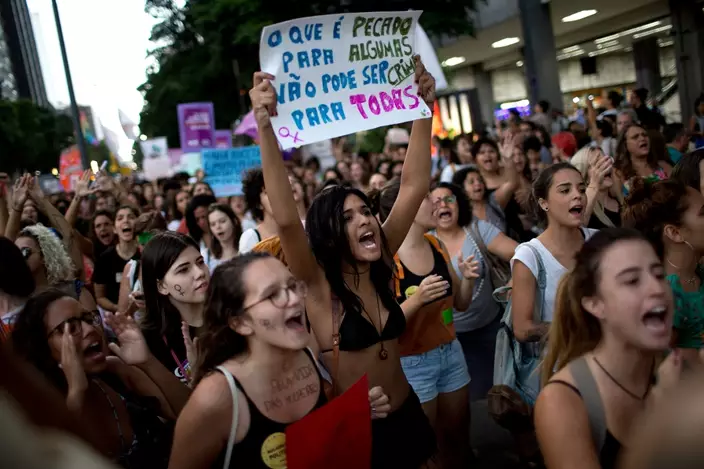
Women march against a proposal for a total ban on abortions, without exceptions, in Rio de Janeiro, Brazil, Monday, Nov. 13, 2017. (AP Photo/Silvia Izquierdo)

Women embrace during a protest against a proposal for a total ban on abortions in Rio de Janeiro, Brazil, Monday, Nov. 13, 2017. (AP Photo/Silvia Izquierdo)
The demonstration in Rio was one of several organized in cities around Brazil on Monday. Women in Rio carried signs reading "Secular uterus" and "I don't deserve to bear the child of my rapist." Others called for broader legalization of abortion.

A woman holds up a sign that reads in Portuguese: "Against clandestine abortion" to protest a recent congressional committee vote to make abortion illegal without exception nationwide, in Rio de Janeiro, Brazil, Monday, Nov. 13, 2017. (AP Photo/Silvia Izquierdo)
While Brazilian law severely restricts abortion, in practice wealthy women tend to have access to safe procedures in private clinics, while the poor often rely on risky ones. An academic survey partially funded by the Ministry of Health estimated that more than 400,000 women had an abortion in Brazil in 2015.

Women march against proposal for total ban on abortions in Rio de Janeiro, Brazil, Monday, Nov. 13, 2017. (AP Photo/Silvia Izquierdo)
TOPEKA, Kan. (AP) — Kansas' Democratic governor on Friday vetoed proposed tax breaks for anti-abortion counseling centers while allowing restrictions on college diversity initiatives approved by the Republican-controlled Legislature to become law without her signature.
Gov. Laura Kelly also vetoed a bill with bipartisan support to increase the penalties for killing a law enforcement dog or horse, a move that the GOP leader who pushed it called “political pettiness.” In addition, she rejected two elections measures fueled at least in part by the influence of people promoting baseless election conspiracies among Republicans.
Kelly's action on the bill dealing with diversity, equity and inclusion initiatives stood out because it broke with her vetoes last year of anti-DEI measure from the current state budget.
The new law, taking effect July 1, prohibits state universities, community colleges and technical schools from requiring prospective students or applicants for jobs or promotions to make statements on their views about diversity, equity and inclusion programs. Kelly let it become law only two days after the state's higher education board adopted its own, narrower ban on the same practices.
“While I have concerns about this legislation, I don’t believe that the conduct targeted in this legislation occurs in our universities," Kelly said in her message on the bill, contradicting statements made by GOP legislators.
Legislators are scheduled to return Thursday from a spring break and wrap up their work for the year in six days. Top Republicans immediately pledged to try to override Friday’s vetoes.
Republicans in about two dozen states have sought to limit DEI initiatives, arguing that they are discriminatory and enforce a liberal political orthodoxy. Alabama and Utah enacted new anti-DEI laws this year, and a ban enacted in Texas last year has led to more than 100 job cuts on University of Texas campuses.
The new policy from the Kansas Board of Regents applies only to state universities and does not specify any penalties, while the new law will allow a fine of up to $10,000 for each violation.
Backers of DEI programs say they are being misrepresented. The American Psychological Association defines diversity, equity and inclusion as a framework to guide “fair treatment and full participation of all people,” especially those in minority groups.
“We need to move forward and focus our efforts on making college more affordable and providing students from all backgrounds with the tools they need to succeed,” Kelly said in her message on the bill.
With the bill helping the state's nearly 60 anti-abortion centers, Kelly's veto was expected because she is a strong supporter of abortion rights. She already has vetoed two other measures championed by abortion opponents this year.
But GOP lawmakers in Kansas have had increasing success in overriding Kelly’s actions. Republican leaders appear to have the two-thirds majorities necessary in both chambers on abortion issues and appeared close on the DEI bill.
The latest abortion measure would exempt anti-abortion centers that provide free services to prospective mothers and new parents from paying the state's 6.5% sales tax on what they buy and give donors to them income tax credits totaling up to $10 million a year.
Kelly said in her veto message that it is not appropriate for the state to “divert taxpayer dollars to largely unregulated crisis pregnancy centers.”
The bill also includes provisions designed to financially help parents who adopt or want to adopt children.
“Governor Kelly has shown once again that her only allegiance is to the profit-driven abortion industry, and not to vulnerable Kansas women, children, and families,” Jeanne Gawdun, a lobbyist for Kansans for Life, the state's most influential anti-abortion group, said in a statement.
Abortion opponents in Kansas are blocked from pursuing the same kind of severe restrictions or bans on abortion imposed in neighboring states, including Missouri, Oklahoma and Texas. A Kansas Supreme Court decision in 2019 declared that access to abortion is a fundamental right under the state constitution, and a statewide vote in August 2022 decisively affirmed that position.
“This bill goes against the wishes of Kansans,” Kelly said in her veto message.
Kelly also has clashed repeatedly with Republicans on voting rights issues.
One of the election bills she vetoed would stop giving voters an extra three days after Election Day to return mail ballots to election officials. Many Republicans said they are responding to constituents' concerns that accepting ballots after Election Day compromises the integrity of election results — though they are fueled by lies from ex-President Donald Trump.
The other elections bill would prohibit state agencies and local officials from using federal funds in administering elections or promoting voting without the Legislature's express permission. Republicans see spending by the Biden administration as an attempt to improperly boost Democratic turnout.
But Kelly chided lawmakers for “focusing on problems that do not exist."
“I would urge the Legislature to focus on real issues impacting Kansans,” Kelly said in her veto message on the second bill.
The veto of the bill on police dogs was perhaps Kelly's most surprising action. Increased penalties have had bipartisan support across the U.S., and Colorado Gov. Jared Polis this week signed a measure this week.
The Kansas measure was inspired by the November death of Bane, an 8-year-old Wichita police dog, who authorities say was strangled by a suspect in a domestic violence case. It would allow a first-time offender to be sentenced to up to five years and fined up to $10,000.
Kelly said the issue needed more study, saying the new penalties for killing a police dog would be out of line with other, more severe crimes, “without justification."
But House Speaker Dan Hawkins, a Wichita Republican and the bill's biggest champion, said: “This veto is a slap in the face of all law enforcement.”
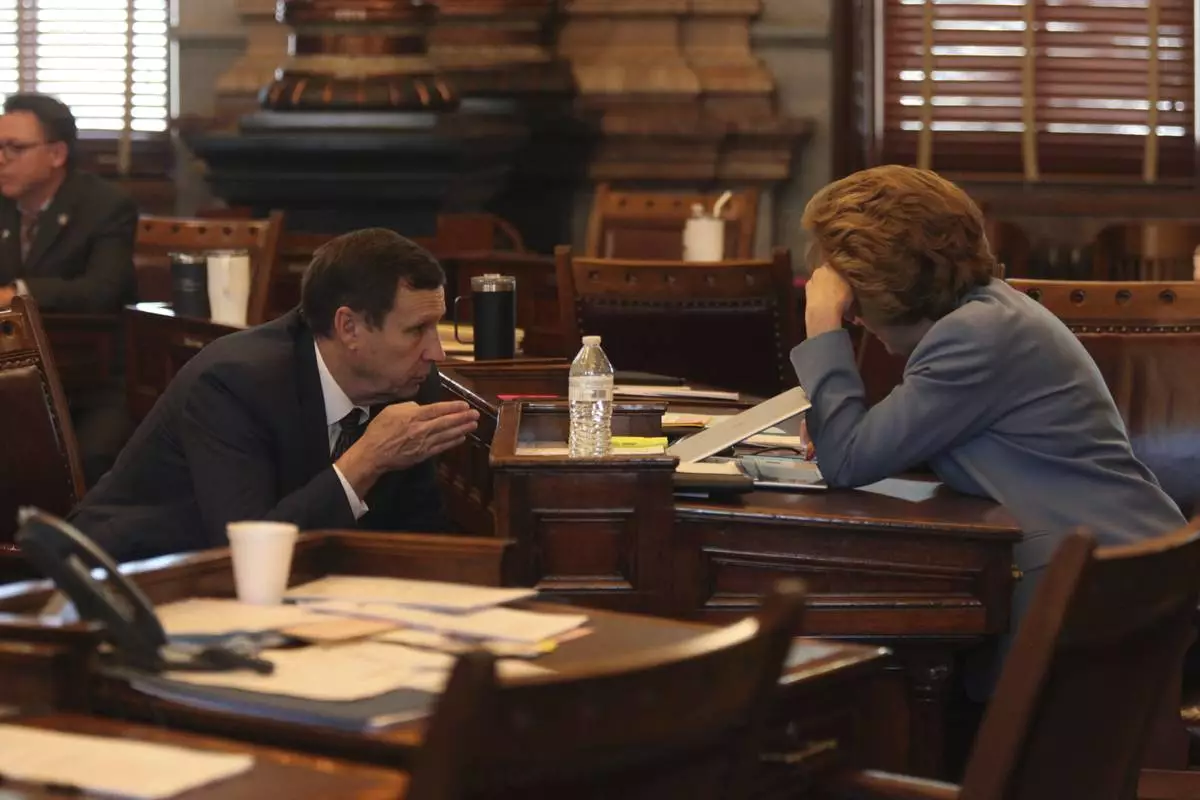
Kansas state Sen. Dennis Pyle, left, R-Hiawatha, confers with Sen. Brenda Dietrich, R-Topeka, during the Senate session, Friday, April 5, 2024, at the Statehouse in Topeka, Kan. Pyle supports a bill to make it a crime to coerce someone into having an abortion, while Dietrich passed the last time senators considered it. (AP Photo/John Hanna)
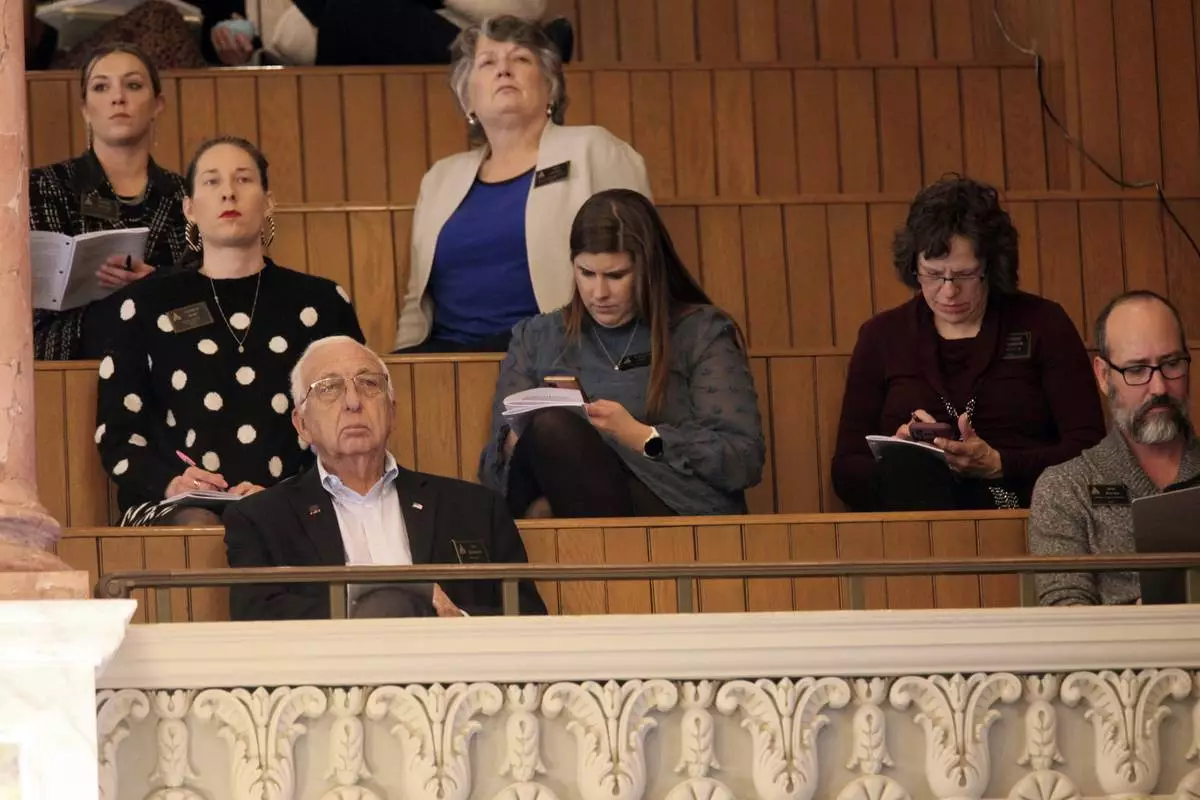
In this photo from Wednesday, March 27, 2024, three anti-abortion lobbyists sit in the second row of the main Kansas House gallery, monitoring its debates and votes, at the Statehouse in Topeka, Kan. They are, left to right, Lucrecia Nold, of the Kansas Catholic Conference; Brittany Jones, of the Kansas Family Voice and Jeanne Gawdun, of Kansans for Life. (AP Photo/John Hanna)
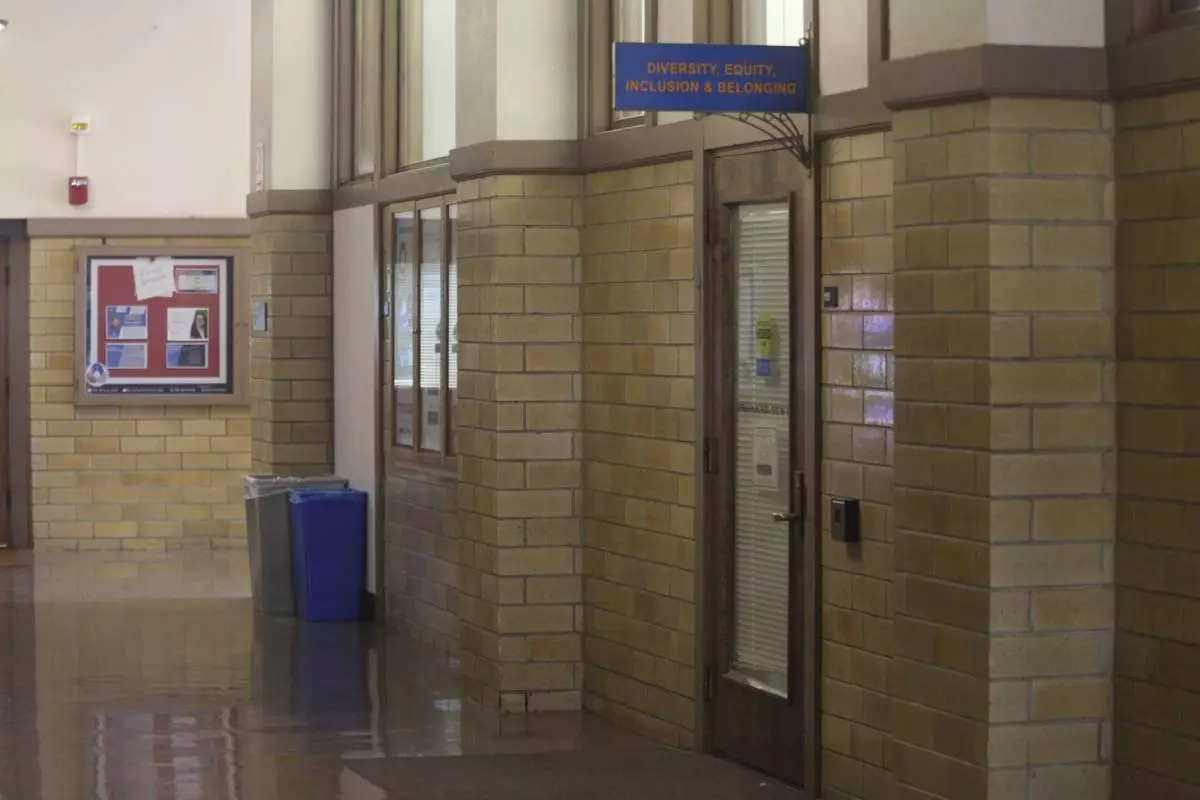
This photo from Friday, April 12, 2024, shows the door to the Office of Diversity, Equity, Inclusion and Belonging in the main administration building on the main University of Kansas campus in Lawrence, Kan. Republican legislators in Kansas and other states are trying to restrict diversity, equity and inclusion initiatives in higher education. (AP Photo/John Hanna)
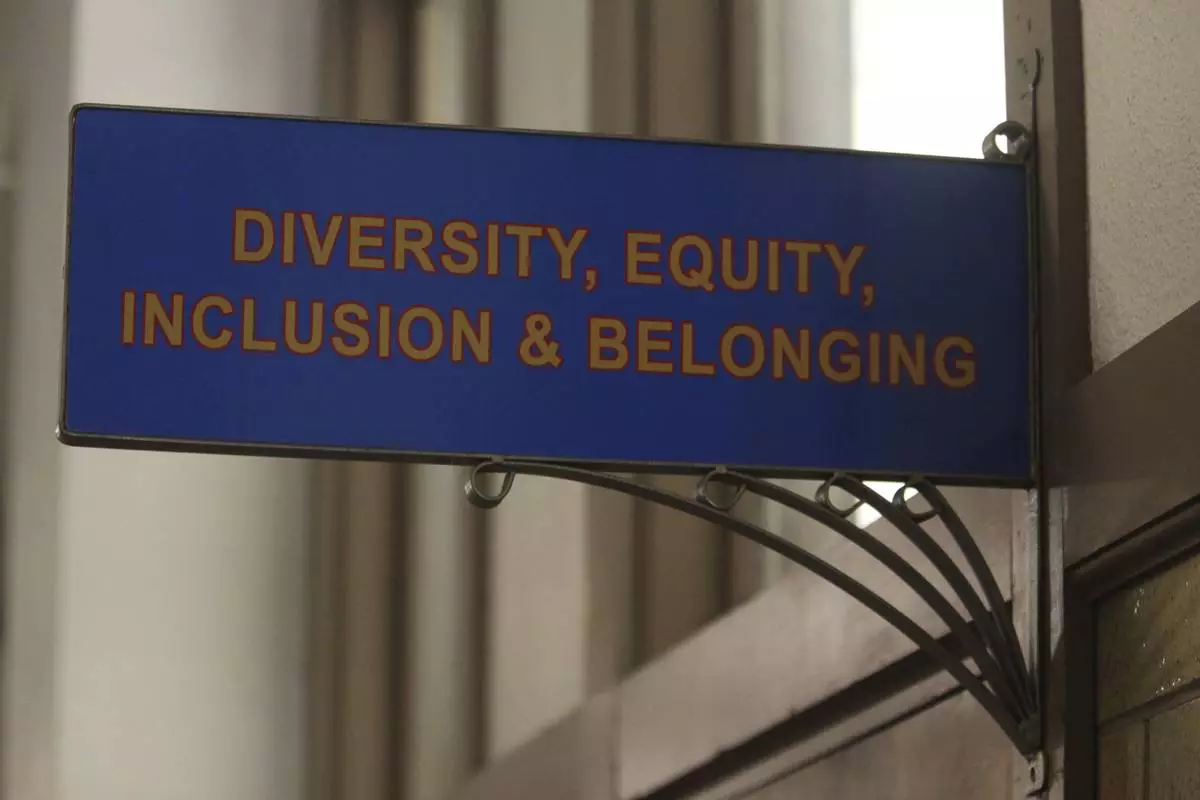
This photo from Friday, April 12, 2024, shows the sign above the door to the Office of Diversity, Equity, Inclusion and Belonging inside the main administration building on the main University of Kansas campus in Lawrence, Kan. Republican lawmakers across the U.S. are seeking to restrict diversity initiatives on colleges campuses, arguing that they enforce a liberal orthodoxy. (AP Photo/John Hanna)
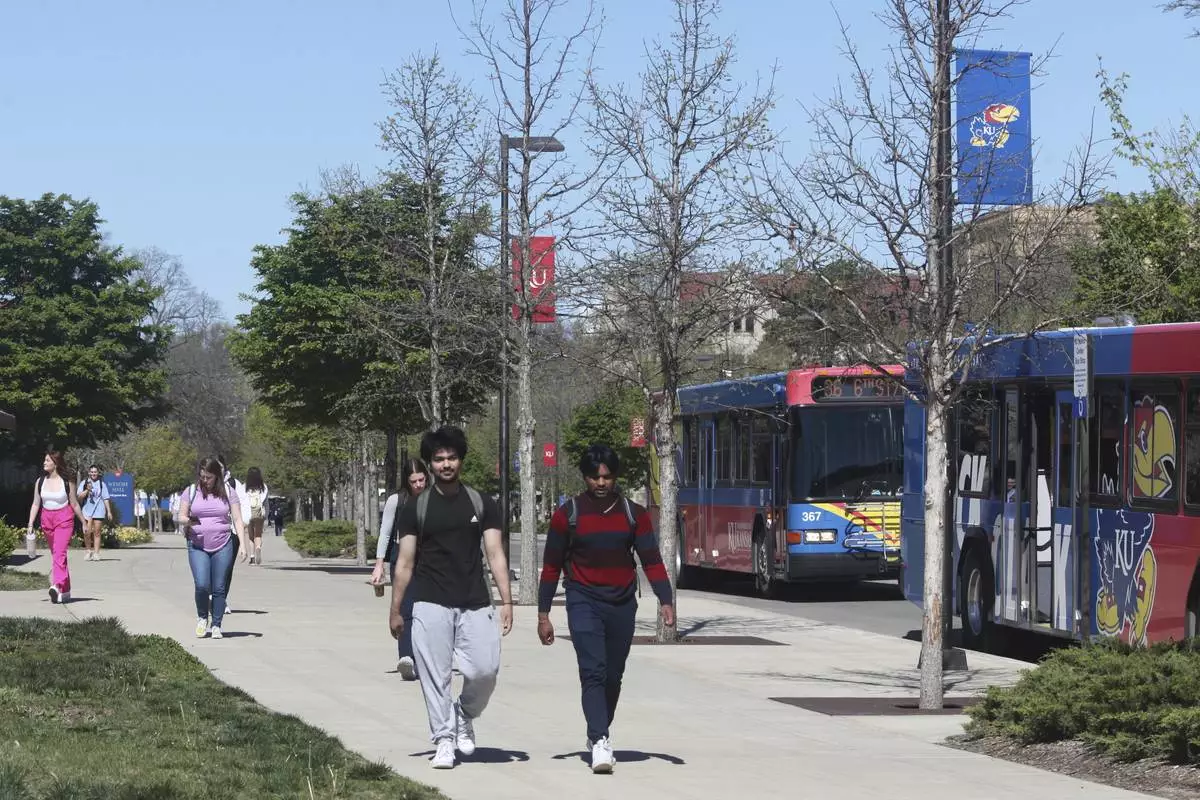
Students walk down Jayhawk Boulevard, the main street through the main University of Kansas campus, Friday, April 12, 2024, in Lawrence, Kan. The Kansas Board of Regents, which oversees higher education, has drafted a new policy against requiring diversity, equity and inclusion statements on applications for students, job seekers and staff promotions. (AP Photo/John Hanna)

















